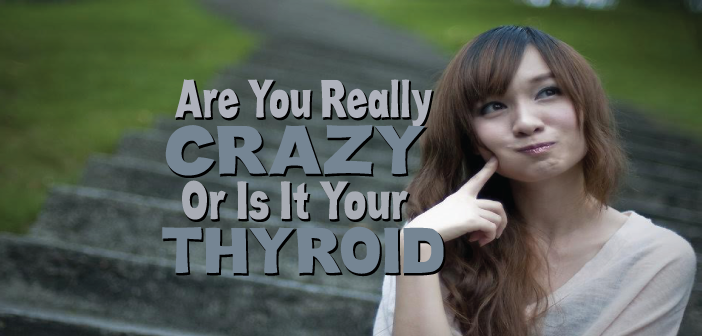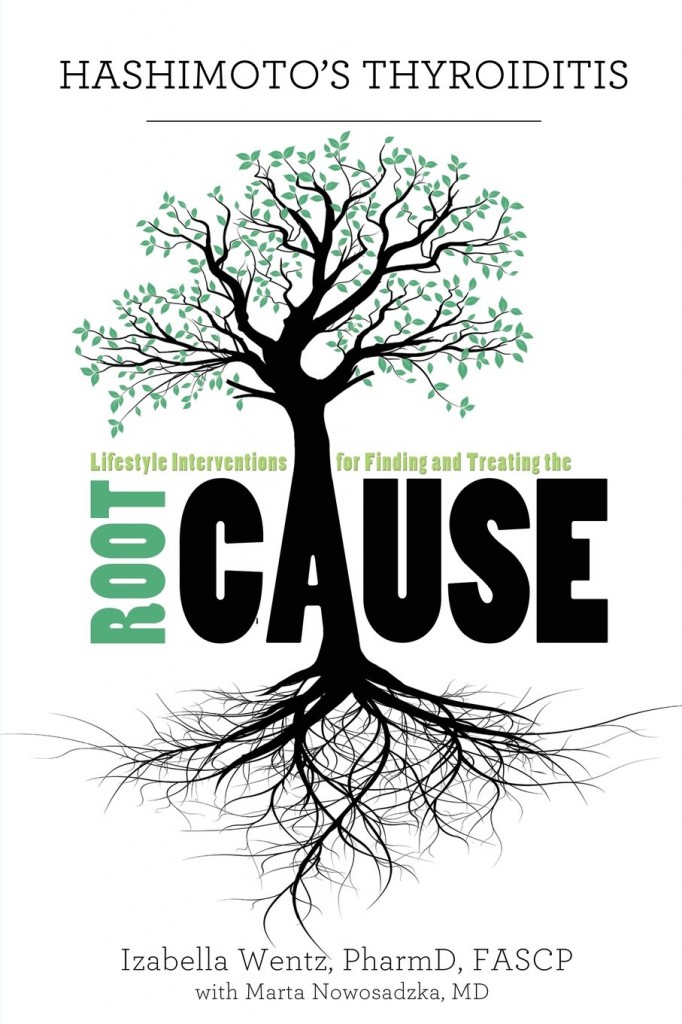
Izabella Wentz, PharmD, FASCP, Guest
Thyroid Nation
Dr. Izabella Wentz discusses the important issue of the thyroid connection to mental illness, depression and anxiety.
I wanted to take time out to write this post as I’ve been getting quite a few questions regarding the connection between Hashimoto’s and mood. Some people have asked if their depression or anxiety or irritability could be related to Hashimoto’s and my answer is: Absolutely! When the thyroid is attacked by the immune system, this results in thyroid cell breakdown. The hormone that is normally stored in the cells gets rapidly released into the blood stream causing a transient hyperthyroidism known as thyrotoxicosis or
 Hashitoxicosis (yes a real word)! Irritability and anxiety are common symptoms of hyperthyroidism. Once the extra hormone gets cleared out a resulting hypothyroidism with the symptoms of apathy and depression can result. Check out my blog post titled “Symptoms of Impaired Thyroid Function” for common symptoms of both. Misdiagnosis As many thyroid symptoms are very non-specific, they are often disregarded by the medical community in the initial stages. Patients are dismissed with having depression, stress or anxiety. Thyroid patients are prescribed anti-depressants or anti-anxiety medications without consideration of thyroid function.
Hashitoxicosis (yes a real word)! Irritability and anxiety are common symptoms of hyperthyroidism. Once the extra hormone gets cleared out a resulting hypothyroidism with the symptoms of apathy and depression can result. Check out my blog post titled “Symptoms of Impaired Thyroid Function” for common symptoms of both. Misdiagnosis As many thyroid symptoms are very non-specific, they are often disregarded by the medical community in the initial stages. Patients are dismissed with having depression, stress or anxiety. Thyroid patients are prescribed anti-depressants or anti-anxiety medications without consideration of thyroid function.
Medical studies have shown that up to one-third of people who fail antidepressants report feeling better once started on Cytomel® (a T3, thyroid hormone).(1) Some patients have even been hospitalized and misdiagnosed as having bipolar disorder or schizophrenia when in fact they were suffering from thyroid imbalances.
Additionally, people with bipolar disorder as well as depressive and anxiety disorders were found to have a higher prevalence of anti-thyroid antibodies.(1) To further complicate the issue, lithium, a medication used for bipolar disorder can trigger Hashimoto’s. (3)
High titer of TPO antibodies has been associated with distress, obsessive-compulsive symptoms and anxiety (1). This is likely as a result of increased amount of thyroid hormone being rushed into the bloodstream causing a transient hyperthyroidism, anyone who has experienced symptoms of hyperthyroidism can describe how terrible this feels. People with anxiety, depression or other mood disorder should have their thyroid function checked, especially TSH, TPO Antibodies and Thyroglobulin Antibodies and TSH receptor antibodies. People with lifelong psychiatric diagnoses have been able to recover after receiving proper thyroid care (2).
From my personal experience…During my work as a consultant pharmacist I saw quite a few patients who were hospitalized for psychosis later to be found to be suffering from hyperthyroidism, and a patient who was found to have under-treated hypothyroidism after being hospitalized for treatment resistant depression.From my personal experience, Hashi’s made me feel like I was going crazy! I would wake up at night alarmed every time my husband would cough, move or turn over. During the day I felt panicky and thought the world was ending, that everyone was against me and nearly jumped out of my seat if someone came to my office at work and surprised me! I was extremely anxious, jittery, emotional and irritable!This was new to me…I used to be really mellow and laid back and slept like a log every night for most of my life. Working in mental health I wondered if something was seriously wrong with me or if I had developed a new onset panic disorder.I went to the doctor, describing my symptoms and asked for a complete physical, instead, I was offered…you guessed it Prozac! While Prozac has helped millions of people with depression, OCD and other conditions, as a pharmacist I am a big proponent of appropriate medication use and believe organic causes need to be explored first, so I continued on my quest with another doctor.Shortly after, I learned that my TPO antibodies were in the 2000 range (normal is usually <30)! After starting thyroid medications, taking Selenium, and balancing my blood sugar my anxiety started to stabilize. Over the course of two years I made additional changes to my diet and supplement regimen, and now I’m the old me once again, cool as a cucumber 🙂 I won’t get started on the diet issue in relation to mood today (I would be here all night) but will talk more about it in future posts.Hope that helps, and know that there is hope for feeling better!
About the Author
Sources
1. Carta MG, Loviselli A, Hardoy MC, Massa S, Cadeddu M, Sardu C, Carpiniello B, Dell’Osso L, Mariotti S. The link between thyroid autoimmunity (antithyroid peroxidase autoantibodies) with anxiety and mood disorders in the community: a field of interest for public health in the future. BMC Psychiatry. 2004 Aug 18;4:25.
2. Cooper R, Lerer B. The use of thyroid hormones in the treatment of depression] Harefuah. 2010 Aug;149(8):529-34, 550, 549
3. Barbesino G. Drugs affecting thyroid function Thyroid. 2010 Jul;20(7):763-70
4. Gaynes BM, et. al. The STAR*D study: Treating depression in the real world. Cleveland Clinic Journal of Medicine. 75 (1), Jan 2008, 57-66.





I was born missing most of my thyroid and at 3 weeks old I was put on synthroid . I have extreme panic disorder and weight fluctuations . I have had my dose tweaked but yet I still don’t see a huge difference . Is it possible I can take something in addition with my synthroid .
Over the past 2 years I have been put on Thyroid medication. I’m not a huge fan of medication but I figured I better try something. During the past 2 years I’ve been having horrible anxiety and panic attacks almost daily. I have been to the doctor and put on an anxiety medication. It’s been two months and I see a very small difference. I also use essential oils for when times get tough and I would rather go to oils than medication. It helps once and awhile but I get so tired of dealing with anxiety on the daily that it ruins certain things I would like to do. I feel like I’m losing my mind sometimes and I know it isn’t the normal me. I use to love having fun and being out with friends and my boyfriend. Now I’m constantly on edge and worrying about anything and everything possible. I feel like the world is againist me and something terrible is going to happen. I know that this isn’t like me at all and after reading this article it literally describes everything happening with me and I just have hope now that I’m not getting the right medication. Thank you for this article.
Hi,
After 12 years of riding a rollercoaster of symptoms I finally got the diagnosis
Of Hashitoxicosis.
I got really bad hyper after moving to a new city for a new job all alone.
I have been hospitalized, in ER several times. Seen many docs.
I am told now that thyroidectomy is the best choice. I am afraid of surgery. I have mild
eye disease, but wonder if a RAI would be better choice?
Thank you for this article. Just diagnosed with TPO antibodies after 2 years of being hypo. I felt like I was going insane! Rapid pulse, jittery, nervous, stressed, exhausted but couldn’t sleep Etc.. any tips on dealing with the anxiety until I am finished with my Hashi’s flare? The mornings are worse I seem to wake up with with almost a panic attack. Also, appetite is gone but stomach is grumbling as I am hungry